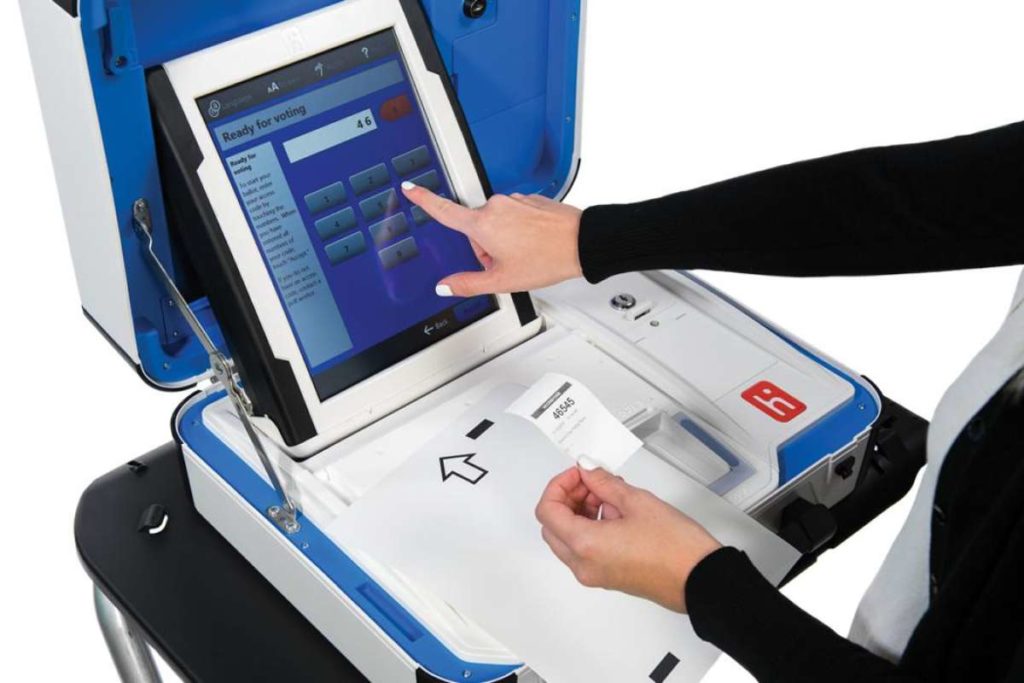Largest Jurisdiction in Texas Stands by Longtime Election Partner
HOUSTON, Texas, January 28, 2021 – Harris County Commissioners voted unanimously this week to upgrade their election system to paper-trail technology from longtime partner Hart InterCivic. Verity® Voting includes enhanced security features, state-of-the-art software and hardware all designed and manufactured in Austin where the company is headquartered.
“Moving to the Hart InterCivic Verity Voting System gives voters a more accessible, secure and verifiable ballot to improve the voting experience for all Harris County Voters,” said Harris County Elections Administrator Isabel Longoria. “My goal is to use the coming weeks to learn and train staff about the Hart voting machines and offer all Harris County voters the opportunity to learn more about the new features.”
The first wave of 2,300 machines is scheduled to be delivered by March 1.
Through a competitive procurement process, the Hart machines were selected by a committee of representatives from Commissioner Court staff, the County Judge and technical experts from the County Clerk and Elections Administrator staff.
“Thank you, Harris County for your continued trust and partnership! We are excited and proud to support your transition to easy-to-use, secure paper-based voting technology,” said Julie Mathis, CEO of Hart InterCivic which has provided election services and solutions to the County for decades.
“Hart and Harris County have a history of innovation and challenges met. We look forward to building on this solid relationship for the benefit of the County’s more than 2.3 million voters,” she said.
The largest voting jurisdiction in Texas, Harris County has selected Verity Duo, a hybrid voting device that combines a touchscreen with a paper vote record available for recounts or audits. The printed ballot can be checked by voters before they feed it into a scanner that reads the voter’s choices, which are never hidden in a barcode.
Verity will also support Harris’ new Vote Centers, which allow any registered voter in the County to cast their Election Day ballot at whichever polling location is most convenient.
“There is no stronger example of Hart’s core values than our long relationship with Harris County,” Mathis said. “Relationships and exceptional customer service drive our success. Our proven, Texas-based products seal the deal. Our partners deserve nothing less.”
For more information about the Verity Voting system, please visit https://www.hartintercivic.com/better-elections/
Media Contact:
Steven Sockwell
512.252.6409
Shortly after the 2000 presidential election, Harris County became one of the country’s early adopters of electronic voting, replacing the error-prone punch-card system implemented in the early 1980s.
Voters lauded the new interface, including the rotary wheel used to operate the machines. Nearly two decades later, Harris County still is using the same equipment, making it the largest county in the United States without an auditable paper trail.
That is set to change as soon as the May 2021 elections, after Commissioners Court on Tuesday unanimously approved a $54 million deal to replace the current eSlate machines with ones featuring touch screens, a paper backup and features that make voting more accessible for seniors and residents with disabilities.

The new machines allow voters to select candidates or ballots measures on a touchpad instead of the rotating wheel, now derided by critics as a clunky feature that some voters mistakenly have used to cast ballots for the wrong candidate.
After voters complete and review their ballots, the machines will print out the selections, at which point voters again can review their ballots for any erroneous choices. They then will take the printed ballots to an electronic ballot box that will record the votes and store the paper ballots, in case the election is called into question and needs to be audited.
“Really, the utility of the paper record is, instead of having to program our machines to spit out receipts, we are getting the record as the voter sees it, into a ballot box that, should we need to count or recount or pull something back later, we can pull it up,” Harris County Elections Administrator Isabel Longoria said Wednesday.
The election results will be stored on two separate hard drives for each voting machine, one of which can only be accessed with a special key provided to Longoria’s office. The new safeguards are expected to provide stronger security than the current system, in which votes are recorded on mobile memory cards that are brought to a central counting site, uploaded onto a computer and tallied.
Longoria also said the new machines may provide faster election results, as votes can only be tallied under the current system using an outdated computer processing software with slower processing speeds than what is widely available today. Harris County election nights have famously stretched well past midnight during previous elections because of the pace of the election results being uploaded.
Though Harris County did not experience any major election malfunctions or security issues using the eSlate machines, experts warned that the aging technology would be inadequate if the election were called into question because of a cyberattack or then-President Donald Trump’s repeated claims that the 2020 election would be “rigged.”
The new machines will be supplied by Hart InterCivic Inc., the same company that provides the county’s current stock of eSlate voting machines. The new system, called InterCivic Verity Voting, was approved in 2019 by the Texas Secretary of State and already used in Tarrant County.
Under the contract approved Tuesday, Hart will provide Harris County with 12,000 machines and an assortment of other election equipment, including voting booths and ballot boxes.
Among the other upgrades are what officials say will be a more robust voting system for residents with disabilities. Longoria described the existing setup as “primitive,” in which voters use red and green “paddles,” or buttons, that replace the scrolling wheel and enter button.
“Now you’ll have, essentially, a remote control attached to the machine that has directional arrows and multiple buttons, so that folks with a different kind of physical need will have the same access to voting,” Longoria said.
The elections administrator’s office will receive the first shipment of devices by March 1. Longoria and her staff will start familiarizing themselves with the machines and decide whether to use them for the May 2021 local elections. If they opt to wait, the machines would be in place for the March 2022 primaries.
“The really big deciding factor for me is, how long will it take to train all of our internal staff on these new machines to feel comfortable with them? And then the turnaround time for us to develop those training materials so that we can really safely and fairly train up the different clerks and judges that will have to use these on Election Day,” Longoria said.
Before commissioners approved the contract with Hart InterCivic on Tuesday, county officials had declined to release information about the deal or any details about the new machines.
The machines were selected by a committee of representatives from each county commissioner’s office, the county judge and technical experts from the county clerk and elections administrator’s staff, according to Longoria’s office. Longoria defended the lack of available details prior to the vote.
“If you release too much information, if you release too many specifics, then you have lobbyists come out of the woodwork,” she said. “People start, without all the information, really lobbying you, and then there’s always a sense of impropriety.”
Zach Despart contributed to this report.
jasper.scherer@chron.com
As part of its overall commitment to voter confidence and election auditability, every new voting system sold by Hart InterCivic will include an auditable paper ballot. As a direct result, Hart has discontinued the sale of paperless Direct-Recording Electronic (DRE) voting systems.
Hart InterCivic recognizes that voter confidence is highest where there is a paper record of every vote, and Hart is committed to taking every step possible to protect America’s trust in our country’s elections. Our decision to include a paper trail in every voting system we sell was primarily driven by Hart’s commitment to developing solutions that support software-independent audits, recounts and risk-limiting audits (RLAs), all of which require a paper-based voting system.
“All Hart InterCivic voting machines are tested and secure, but we believe that focusing our efforts on paper-based voting systems is an important step to further enhance voter confidence,” said Julie Mathis, CEO of Hart InterCivic, an Austin-based company with more than 100 years of experience providing election solutions. “The use of paper-based ballots will lead to increased levels of auditability and usability, as well as provide an extra layer of assurance for voters that their votes are being counted as cast. Voter confidence has been and will remain a top priority for all of us at Hart.”
While existing DRE customers will continue to receive support from Hart, we will also enable customers to transition to a paper-based voting system through the unique versatility of the Verity system. Specifically, Verity DRE customers can choose to return their DRE units to Hart where they can be converted to our paper-based Verity Duo units. These new devices, along with new precinct scanners, will allow jurisdictions to transition quickly and easily to paper-based voting in a conversion process that is more cost effective than the purchase of a full new set of equipment. As an added benefit, the voter selections from the paper ballots produced by the Verity system are not hidden in unreadable barcodes or QR codes, but rather are in human readable form. Verity is the only voting system on the market that provides this assurance that votes are captured based on the same information voters can personally read and review.


